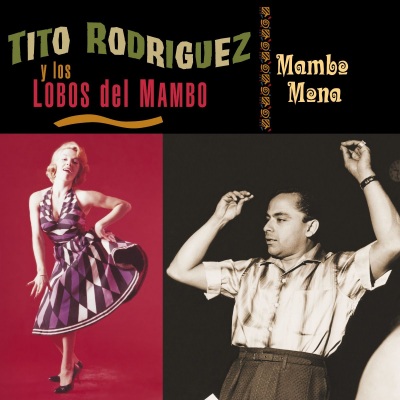
Mambo Mona
Besides being equally talented as an up-tempo improvising sonero and romantic ballad singer, Pablo ‘Tito’ Rodríguez (born in Santurce, Puerto Rico, on January 4, 1923) was also a percussionist who fronted an extremely tight, professional, and creative big band. After stints with the guitar groups Cuarteto Mayari in Puerto Rico and Cuarteto Caney in pre-war New York, in 1939 he became the maraca player and vocalist for his brother Johnny’s Conjunto Siboney, for whom he made his first recording, Oye Mi Bajo, in February 1940. Early in 1941, Tito was Enric Madriguera’s vocalist but left the band in March 1942 to replace Miguelito Valdés in the Xavier Cugat Orchestra, where he spent a brief period. The next year he joined the U.S. Army, but as soon as he had received his discharge he sang with the pianist-bandleader Noro Morales, before switching to José Curbelo in 1946. On February 7, 1947, Tito recorded four tunes with the Chano Pozo Orchestra (which was really the Machito band). Recently married but without work, having been fired by Curbelo due to personal differences, he found various singing jobs, mostly one-nighters. Then in December 1947 he decided to organize a quintet which was to feature Gilbert Lopez on piano, Luis Barreto on bass, Chino Gonzalez on trumpet, Ignacio Reyes on percussion and Rodrígo on vocals – but after just four months of work the group disbanded in 1948. Later that same year Tito formed an eight-piece conjunto, which became known as Tito Rodríguez and the Mambo Devils – this was during the days when Perez Prado’s Mambo No. 5 had exploded on the scene, thereby kicking off the era of the mambo. It was not long before the conjunto changed its name to Tito Rodríguez y sus Lobos del Mambo, and it features here on these sessions. Tito became one of the main attractions at the Palladium Dance Hall on Broadway, along with the bands of Tito Puente and Machito, and the talk of Spanish Harlem among the bands wo battled for the number-one-spot at the time. He made several recordings during the Fifties, besides touring and playing Las Vegas, Miami, and other major show business centers. During the 1960s he moved to Puerto Rico for a while, still recording and playing intensively, right up until his untimely death from leukemia in New York in February 1973. At its peak, the Rodríguez band’s blend of Cuban-oriented numbers and tight, solo-filled instrumentals equalled any of its rivals. Among his many vocal classics was Mama Guela, and among the tracks here there’s the original version with its original title, Mambo Mona. Note the biting brass, and the excellent trumpet solo by ‘Chino’ Gonzalez.
